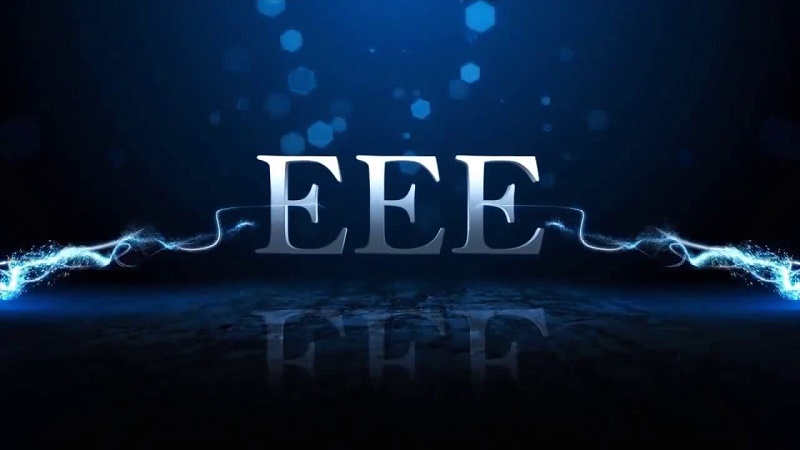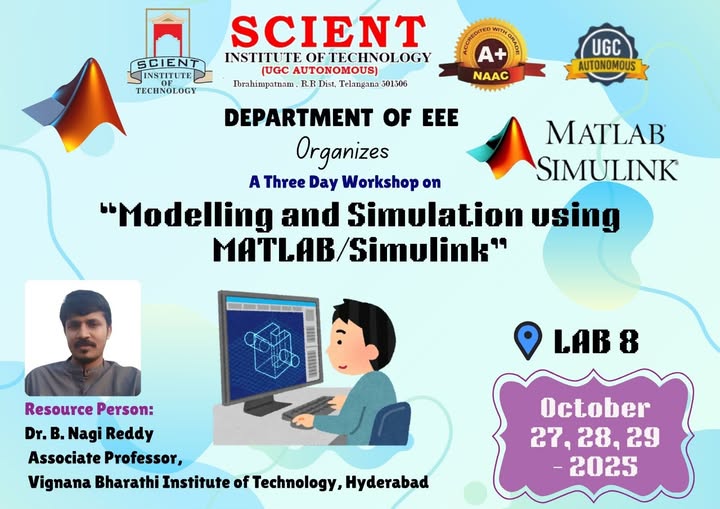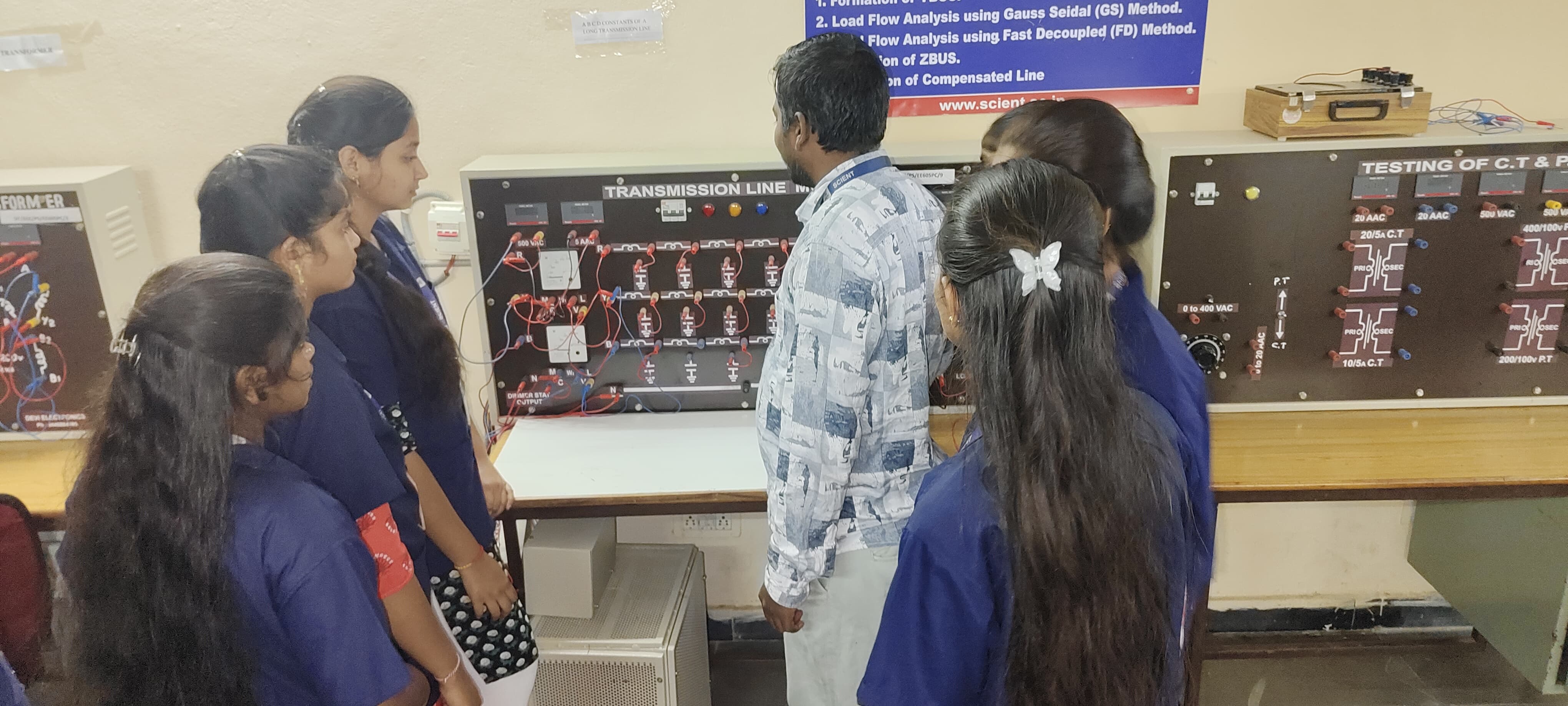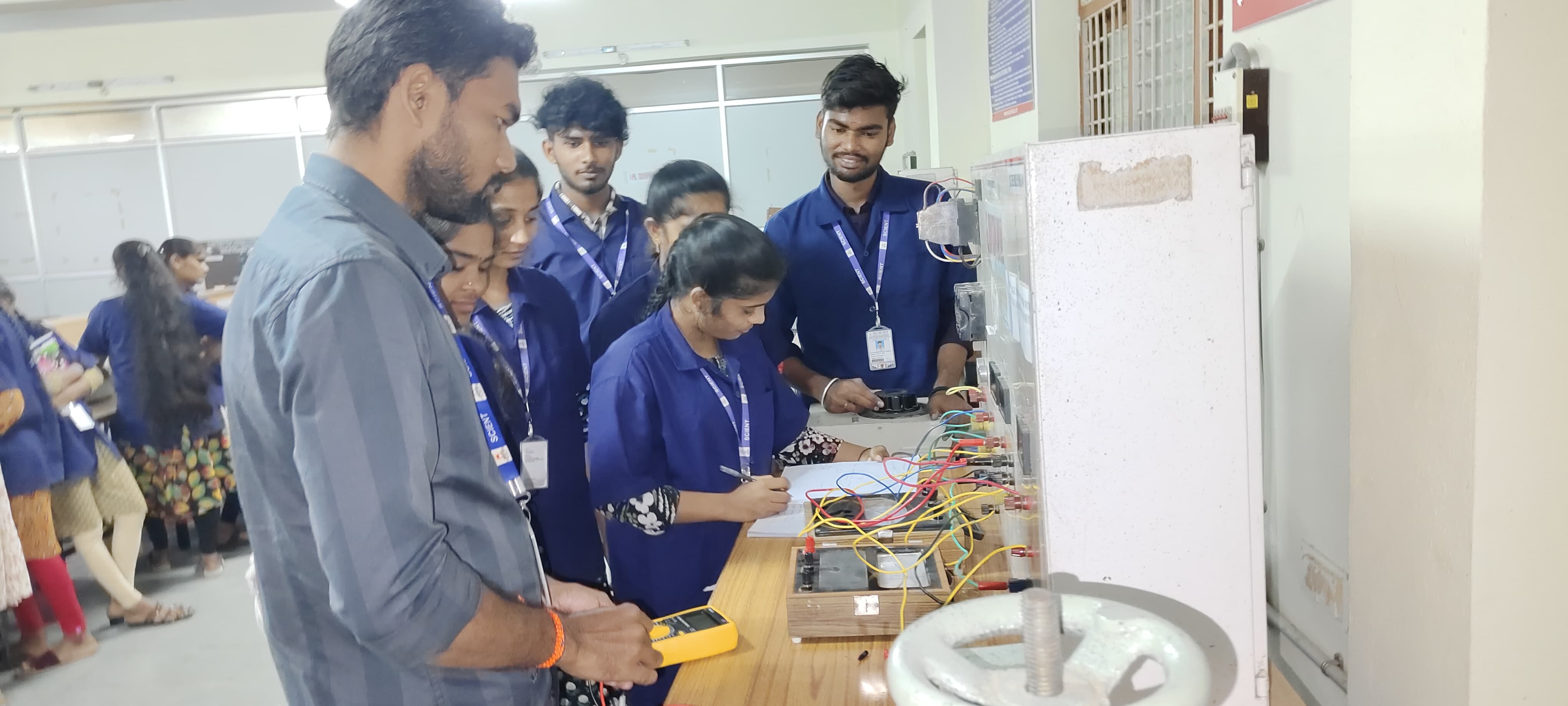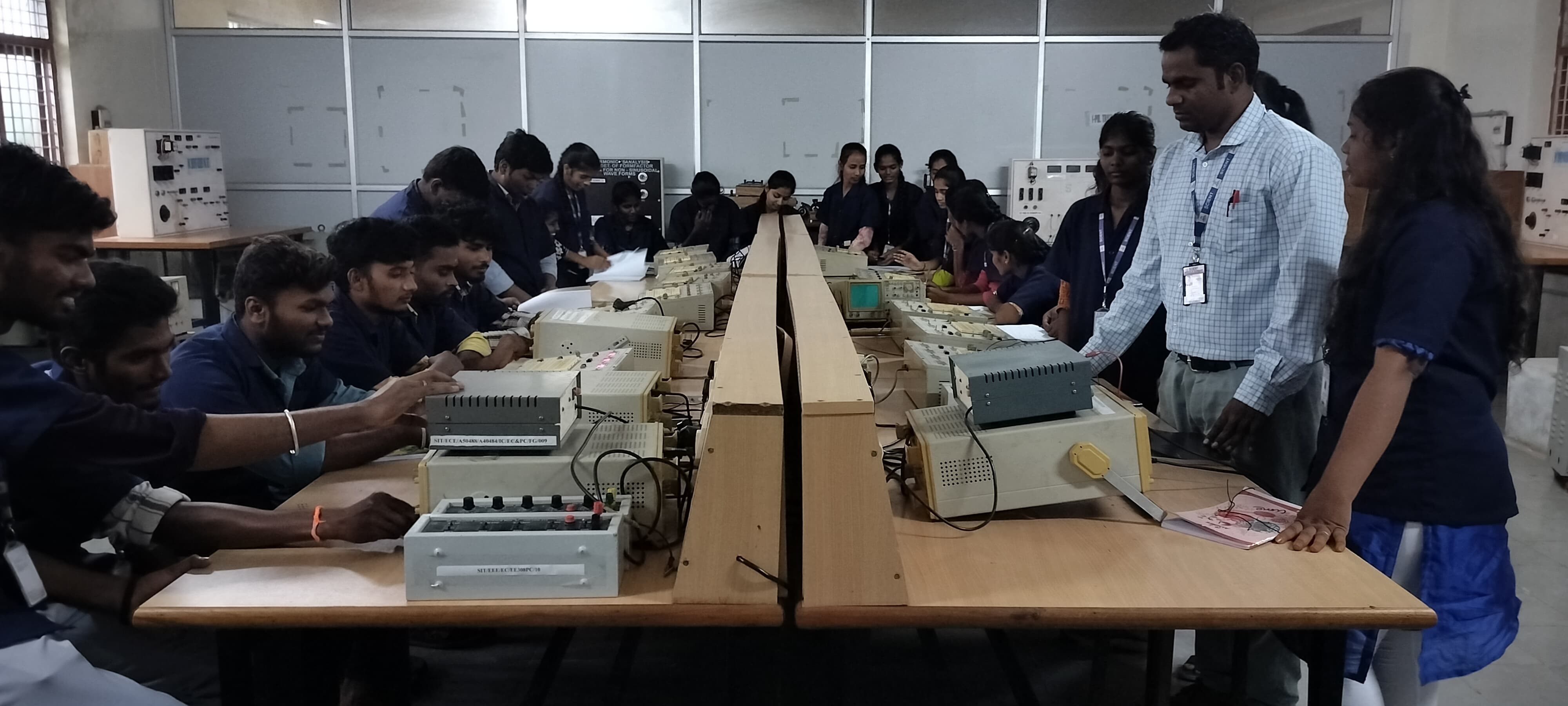- ABOUT DEPARTMENT
- HEAD OF THE DEPARTMENT
- VISION AND MISSION
- OBJECTIVES AND OUTCOMES
- COURSES
- FACULTY
- FACILITIES AND ASSETS
- ACTIVITIES
- ACHIEVEMENTS
- SCHEDULES
- DEPARTMENT DASHBOARD
The Department of Electrical and Electronics Engineering was established in the year 2001. The Department offers under graduate programme in Electrical and Electronics Engineering (intake 30) .The Department is well equipped laboratories for suitable instructions and hands on experience As per AICTE Norms. The Department has experienced and well qualified faculty members with over ten years of teaching experience. Seminars and workshops are conducted to improve and encourage The inherent talent of students. The Department has a well-equipped library with reference books, journals, magazines and CD also.
VISION
To foster, quality in
imparting knowledge, develop skills and prepare graduates in achieving global
excellence in Electrical Engineering education, research and industry
MISSION
a) To enhance the cognitive, effective and psychomotor domains
of students through appropriate teaching-learning process, research and
development activities
b) To evolve as an innovative & globally competent
Electrical Engineering department that contributes to the Socio-economic needs
of the nation by utilizing the advancement in Electrical Engineering by
providing conductive learning and interactive environment to students and
faculty
c) To execute projects with integrity and ethics keeping pace
with the latest trends in industry
PROGRAM EDUCATIONAL OBJECTIVES(PEOs) | |
The graduate of Electrical & electronics Engineering will be: | |
PEO 1 | Possess strong educational footing in Science, Mathematics and Electrical Engineering which is essential in making successful careers in Higher Education/Research/ Industry and will understand the professional responsibility in modern Electrical Power and Energy related Industry through global requirements |
PEO 2 | To train the students such a manner that they should function effectively in the multicultural and multidisciplinary groups in their practice of Electrical Engineering profession |
PEO 3 | Possess solid foundation in Electrical and electronics Engineering along with effective communication in management, teamwork and entrepreneurship skills for tackling social issues |
PROGRAM OUTCOMES(POs) | |
PO 1 | Engineering knowledge: Apply the knowledge of Mathematics, Science, Engineering fundamentals, and an Engineering specialization to the solution of complex Engineering problems. |
PO 2 | Problem analysis: Identify, formulate, review research literature, and analyze complex engineering problems reaching substantiated conclusions using first principles of Mathematics, Natural sciences, and Engineering sciences |
PO 3 | Design/development of solutions: Design solutions for complex engineering problems and design system components or processes that meet the specified needs with appropriate consideration for the public health and safety, and the cultural, societal, and environmental considerations. |
PO 4 | Conduct investigations of complex problems: Use research-based knowledge and research methods including design of experiments, analysis and interpretation of data, and synthesis of the information to provide valid conclusions. |
PO 5 | Modern tool usage: Create, select, and apply appropriate techniques, resources, and modern engineering and IT tools including prediction and modeling to complex engineering activities with an understanding of the limitations |
PO 6 | The engineer and society: Apply reasoning informed by the contextual knowledge to assess societal, health, safety, legal and cultural issues and the consequent responsibilities relevant to the professional engineering practice. |
PO 7 | Environment and sustainability: Understand the impact of the professional engineering solutions in societal and environmental contexts, and demonstrate the knowledge of, and need for sustainable development. |
PO 8 | Ethics: Apply ethical principles and commit to professional ethics and responsibilities and norms of the engineering practice. |
PO 9 | Individual and team work: Function effectively as an individual, and as a member or leader in diverse teams, and in multidisciplinary settings. |
PO 10 | Communication: Communicate effectively on complex engineering activities with the engineering community and with society at large, such as, being able to comprehend and write effective reports and design documentation, make effective presentations, and give and receive clear instructions. |
PO 11 | Project management and finance: Demonstrate knowledge and understanding of the engineering and management principles and apply these to one’s own work, as a member and leader in a team, to manage projects and in multidisciplinary environments. |
PO 12 | Life-long learning: Recognize the need for, and have the preparation and ability to engage in independent and life-long learning in the broadest context of technological change. |
PROGRAM SPECIFIC OUTCOMES(PSOs) | |
PSO 1 | Incorporating fundamental concepts of mathematics and science to identify, formulate, design and analyze various issues of renewable energy systems by providing developments in the areas of power electronics, power systems, electro-mechanical and control aspects |
PSO 2 | Motivate for continuous self learning in engineering practice and pursue research in advanced areas of Electrical Engineering in order to offer engineering services to the Nation. |
PSO 3 | Demonstrate proficiency in use of modern software tools for design, simulation and analysis of electrical systems to adapt in multidisciplinary environments |
|
S.NO |
PROGRAMS |
DURATION |
INTAKE |
|
1 |
B.Tech (EEE) |
4 years |
30 |
FACILITIES AND ASSETS
The
department of EEE has well equipped infrastructure facilities in all the thrust
areas. Students get a wide exposure and practical hands-on training in the sophisticated
equipment’s during their lab sessions.
In
addition, various electrical switchgear, transformers, dynamometers, Analog and
digital meters, load banks (resistive, inductive, and capacitive), and other
equipment are also available for experiments in electrical engineering.
LAB SUBJECTS
|
S.No. |
NAME
OF THE LAB |
YEAR
& SEM |
PROGRAM |
|
R18 REGULATION |
|||
|
1 |
Basic
Electrical Engineering Lab |
I
YEAR I SEM |
EEE |
|
2 |
Electrical
Machines Lab-I |
II
YEAR I SEM |
EEE |
|
3 |
Electrical
Circuits Lab |
II
YEAR I SEM |
EEE |
|
4 |
Electrical
Machines Lab – II |
II
YEAR II SEM |
EEE |
|
5 |
Control
Systems Lab |
II
YEAR II SEM |
EEE |
|
6 |
Power
System Simulation Lab |
III
YEAR I SEM |
EEE |
|
7 |
Power
Electronics Lab |
III
YEAR I SEM |
EEE |
|
8 |
Measurements
and Instrumentation Lab |
III
YEAR I SEM |
EEE |
|
9 |
Power
System Lab |
III
YEAR II SEM |
EEE |
|
10 |
Electrical
& Electronics Design Lab |
IV
YEAR I SEM |
EEE |
|
R22 REGULATION |
|||
|
1 |
Elements
of Electrical and Electronics Engineering |
I
YEAR I SEM |
EEE |
|
2 |
Electrical
Circuit Analysis Laboratory |
I
YEAR II SEM |
EEE |
|
3 |
Electrical
Machines Laboratory-I |
II
YEAR I SEM |
EEE |
|
4 |
Electrical
Simulation tools Laboratory |
II
YEAR I SEM |
EEE |
|
5 |
Measurements
and Instrumentation Laboratory |
II
YEAR II SEM |
EEE |
|
6 |
Electrical
Machines Laboratory-II |
II
YEAR II SEM |
EEE |
|
7 |
Power
Electronics Laboratory |
III
YEAR I SEM |
EEE |
|
8 |
Power
System Laboratory |
III
YEAR II SEM |
EEE |
|
9 |
Control
Systems Laboratory |
III
YEAR II SEM |
EEE |
|
10 |
Simulation
of Renewable Energy Systems Laboratory |
IV
YEAR I SEM |
EEE |
NPTEL
NPTEL has also initiated open online courses with certification where courses in different domains are regularly launched. NPTEL is now offering online certification courses through its portal https://onlinecourses.nptel.ac.in. There are 4wk, 8wk as well as 12wk courses offered twice a year. At the end of the course a certification exam (optional) is held on specific dates at specific centers. Certificate from IIT is awarded to those who register and appear for the examination. These exams have nominal fees with facility of scholarship and partial fee waiver for SC/ST candidates.We are glad to announce that our institution now also have approved NPTEL local chapter from Jan 2018 and coordinated by Dr.B.Sridhar, Professor, Dept of ECE (https://nptel.ac.in/LocalChapter/statistics/1541/).This will facilitate our students and faculties to use NPTEL contents better, apply for scholarships. All are invited to be part of this and take benefits.
NPTEL Course Enrollment A.Y 2024: Click here
List of Courses to enroll: Click here
- Dept of EEE organized A two day workshop on "Arithmetic & Reasoning" in association with TASK on Jan 31th 2023 and Feb 2 2023.
- Dept of EEE organized A three day workshop on "21st Century Transferable Skills" in association with TASK during 06-02-2023 to 08-02-2023.
STUDENTS ACHIEVEMENTS
Our
students have published paper in International Journal of Research in
Engineering, Science and Management (IJRESM) ISSN: 2581-5792, in Volume 7,
Issue 6, June 2024. Entitled “Hybrid Renewable Energy based Dual Power Electric
Vehicle Charging Station”, details are as follows
|
AUTHORS |
TITLE |
JOURNAL |
DOWNLOAD |
|
Venu.C 21C05A0203 |
Hybrid Renewable Energy based Dual Power Electric
Vehicle Charging Station |
International Journal of Research in Engineering,
Science and Management --IJRESM |
https://journal.ijresm.com/index.php/ijresm/article/view/3067
|
|
Karthik.D 21C05A0205 |
|||
|
Mohd Sofyan Nawaz 20C01A0232 |
|||
|
Shireesha.V Assistant Professor EEE |
Mrs.V.Shireesha
Mrs.Shireesha.V,
Associate Professor & Head, Department of EEE. She has
obtained her B.Tech(EEE) from JNTUH and M.Tech from JNTUH. She has 10 years of
teaching experience in engraving students’ career and who is expert in her own
disciplines, aims at educating and training students with sound knowledge. She
has published research papers in various reputed International journals and
Conferences. Attended various FDP's and Workshops in Cutting edge
technologies. Her area of interest includes power systems, power electronics, network
theory, control systems and Renewable Energy Source.
Mobile No : 9176068411
Email ID
: eee@scient.ac.in ,
eee.scient@gmail.com
Schedules
No Data Found
No Data Found
 Dept of EEE organizing a A Two day workshop on "Embedded with IoT" during April 24,25 - 2025 in association with Datapoint Info solutions, Hyd.
Dept of EEE organizing a A Two day workshop on "Embedded with IoT" during April 24,25 - 2025 in association with Datapoint Info solutions, Hyd.



